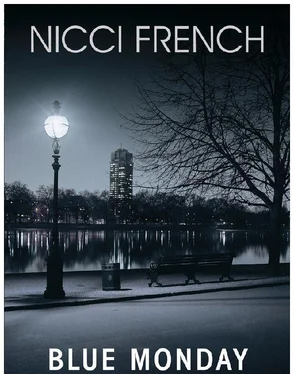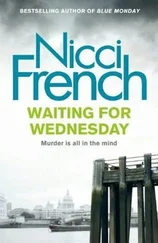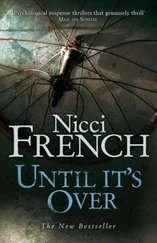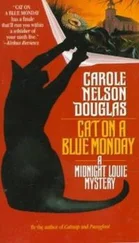Number 9 was warm inside, and plainly decorated. It smelt of baking bread and coffee. There were only half a dozen wooden tables, most of them empty, and some stools at the bar.
The woman behind the counter raised her hand in greeting. ‘How are you since this morning?’
‘Good,’ said Frieda. ‘Kerry, this is my colleague, Jack. Jack, this is Kerry Headley.’
Jack, pink with gratification at being called Frieda’s colleague, muttered something.
Kerry beamed at him. ‘What can I get you? There aren’t many cakes left – Marcus is going to make some more soon. He’s collecting Katya from school at the moment. There are a few flapjacks left.’
‘Just coffee,’ said Frieda. ‘From your shiny new machine, thanks. Jack?’
‘Same,’ said Jack, although he was already twitchy with caffeine and nerves.
They sat at a table by the window, facing each other. Jack took off his bulky coat and Frieda saw that he was wearing brown corduroy trousers and a vividly striped open-necked shirt with a lime green T-shirt visible underneath. His trainers were grubby and his tawny hair was wild, as if he’d spent the day pushing his fingers into it in exasperation.
‘Is that what you wear when you see your patient?’ said Frieda.
‘It’s not the exact clothes. This is just what I wear. Is that a problem?’
‘I think you should wear something more neutral.’
‘Like a suit and tie?’
‘No, not like a suit and tie. Something boring, like a plain shirt or a jacket. Something more invisible. You don’t want the patient to get too interested in you.’
‘There’s not much chance of that.’
‘What do you mean?’
‘This guy I’m meant to be giving therapy to is just completely self-absorbed. That’s what his real problem is. I mean, that’s bad, isn’t it? If I’m starting to find my very first patient a complete pain in the arse.’
‘You don’t need to like him. You just need to help him.’
‘This guy,’ Jack continued, ‘is having problems with his marriage. But it turns out that the problems have arisen because there’s a woman in his office he wants to sleep with. He’s basically gone into therapy because he wants me to agree with him that his wife doesn’t understand him and that it’s OK for him to go and explore other possibilities. It’s like he’s got to go through the hoops so that he can give himself permission and feel good about it.’
‘And?’
‘When I was at medical school I thought I was being trained to cure people. In their bodies, in their minds. I’m not very happy if my job as a therapist is just to make him feel all right about cheating on his wife.’
‘Is that what you think you’re doing?’ Frieda looked at him attentively, noting his mixture of nervousness and impassioned eagerness. He had eczema on his wrists and his nails were bitten. He wanted to please her and he wanted to challenge her. He spoke quickly, in a rush of words, and the colour came and went on his cheeks.
‘I don’t know what I’m doing,’ said Jack. ‘That’s what I’m saying. This is where I can be honest, right? I don’t feel comfortable encouraging him to be unfaithful. On the other hand, I can’t just say, “Thou shalt not commit adultery.” That’s not therapy.’
‘Why shouldn’t he commit adultery?’ said Frieda. ‘You don’t know what his wife is like. She could be forcing him into it. She could be committing adultery herself.’
‘All I know about her is what he tells me. You say people need to find a narrative for their lives. He seems to have found one and it’s bloody convenient for him. I’m trying to have empathy for him, though he makes that difficult, but he’s not trying to have empathy for his wife. Or anyone. I’m troubled by this. I don’t know what to do. I don’t want to just collude with him in being a sleazebag. What would you do?’
And he sat back and picked up his coffee, spilling some of it as he lifted it to his mouth. Behind him, a stocky man came through the door, towing a child, whose large school backpack made her look like a tortoise. The man nodded at Frieda and raised his hand in greeting.
‘You can’t give therapy to the world,’ said Frieda. ‘And you can’t go out and change it to suit yourself. All you can do is deal with that little bit of the world that’s in your patient’s head. You don’t want to give him permission, that’s not your job. But you want him to be honest with himself. When I talk about a narrative, I didn’t mean that any narrative would do. You could start by trying to get him to understand why he wants your approval for this. Why doesn’t he just go and do it?’
‘If I put it like that, maybe he will just go and do it.’
‘At least he’ll be taking responsibility for it, instead of shuffling it off on you.’ Frieda paused and thought for a moment. ‘Are you getting on with Dr McGill in those group-therapy sessions?’
Jack looked wary. ‘I don’t think he has much time for me. Or any of us, actually. I’d heard so much about him before I got a placement at the Warehouse, but he seems a bit stressed and distracted. I don’t think we’re his priority. You’re the one who knows him, aren’t you?’
‘Maybe.’
Lately, Reuben McGill had started to find fifty minutes a long time to go without a cigarette. He finished one in his office and put an extra-strong mint lozenge into his mouth. He knew it was useless. People could smell cigarettes on you now whatever you did. It had been different twenty years ago, when everything in the world had smelt very slightly of cigarette smoke. Still, what did it matter? Why was he even sucking a mint to cover it up? It wasn’t as if it was illegal.
He stepped into the waiting room to find Alan Dekker waiting there, ready for his first session. He led him through to one of the three session rooms they had in the clinic. Alan looked around. ‘I thought there’d be a couch,’ he said. ‘Like you see in films.’
‘You don’t want to believe everything you see in films. I think it’s better just to face each other. Like normal people.’
He gestured Alan into a grey upright armchair, stiff at the back so that it would make him sit straight and face forward. Reuben sat opposite. They were about six feet apart. Not so close that the proximity was oppressive. Not so far that anybody needed to raise their voice.
‘So what do you want me to say?’ said Alan. ‘I’m not used to this.’
‘Just talk,’ said Reuben. ‘We’ve got plenty of time.’
It had been only three minutes, maybe four, since Reuben had finished his cigarette. He had extinguished it on the railing out on the fire escape, though it was only a little more than half smoked, and dropped it into the concrete area below. He wanted a cigarette again. Or, at least, he couldn’t stop himself thinking about a cigarette. It wasn’t just about smoking it. It was a way of measuring out the time, and it was something to hold. Suddenly he didn’t know where to put his hands. On the arms of the chair felt too formal. On his lap felt too bunched up, as if he were trying to hide something. He moved between one and the other.
When Reuben had created the clinic in 1977, he was only thirty-one years old and one of the most famous analysts in the country. In fact, it had been more like a group or a movement than a clinic. He had developed a version of therapy that was more eclectic and less rule-bound than the traditional therapies at the time. It was going to transform the whole discipline. His picture appeared in magazines. He was interviewed in newspapers. He presented TV documentaries. He wrote books with mysterious, slightly erotic-sounding titles ( Desire and Learned Helplessness , The Playfulness of Love ). He had started out in the living room of his Victorian terraced house in Primrose Hill, and even when the clinic became an NHS-funded institution and moved up to Swiss Cottage, it had kept a Bohemian feel. The Warehouse had been designed by a modernist architect, who retained the steel girders and rough brick walls of the original building, then threw in lots of glass and stainless steel. Yet gradually something had been lost. What Reuben found hard to admit to himself was that there had never really been a new version of therapy. Reuben McGill had been a handsome and charismatic figure, and he had attracted colleagues and patients the way a religious leader attracted followers. Gradually the handsomeness and the charisma had faded. His therapeutic methods had proved hard to replicate, and the range of conditions for which they were deemed suitable had gradually narrowed and narrowed. The Warehouse was a success and well respected. It changed some people’s lives, but it wasn’t going to change the world.
Читать дальше












